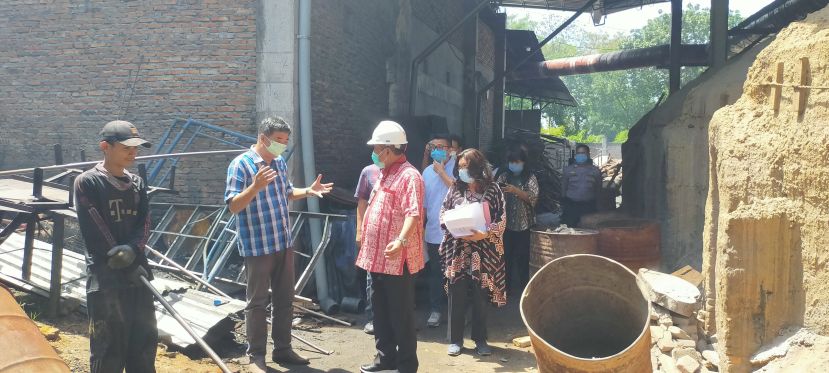


By using the simplest technology, one of the Micro Small and Medium Enterprises (MSMEs) under the guidance of PT Kawasan Industri Medan (KIM) can expand the export of wood charcoal to Korea and convert smoke into organic liquid fertilizer.
According to the manager, Ridwan has been in the field for 8 years since the UMKM has been producing export quality charcoal and organic liquid fertilizer. Charcoal made from wood exported to Korea is considered very good can reach the heat lvel of 1,500 degrees Celsius, but does not emit fire and durable so if used to heat food so it is of high quality and is very good for human health.
By using the simplest technology, one of the Micro Small and Medium Enterprises (MSMEs) under the guidance of PT Kawasan Industri Medan (KIM) can expand the export of wood charcoal to Korea and convert smoke into organic liquid fertilizer.
According to the manager, Ridwan has been in the field for 8 years since the UMKM has been producing export quality charcoal and organic liquid fertilizer. Charcoal made from wood exported to Korea is considered very good can reach the heat lvel of 1,500 degrees Celsius, but does not emit fire and durable so if used to heat food so it is of high quality and is very good for human health.
The export of the charcoal is one container per month to Korea, but has been developed in Sipirok, Nias, and Marelan District, Medan City and in Coal in order to successfully meet the consumer's quota abroad. Korea asks that it exports 20 containers every month but is still constrained because it cannot produce as much as that demand.
In the process of burning charcoal, the smoke does not come out into the air but is processed into organic liquid fertilizer so that a healthy environment does not occur air pollution.
"The results of the organic liquid fertilizer made from smoked raw materials have been tested on rice plants such as in Hamparan Perak District, Pematang Johar, Deli Serdang Regency and Batubara District, the results are very satisfying, increasing 30 percent from the usual harvest," Ridwan said.
Meanwhile, President Director of PT KIM Trisilo Ari Setyawan, Thursday (6/25) during a visit to SMEs, Small and Medium Enterprises (SMEs) and Small and Medium Industries (IKM) under the guidance of PT KIM said that 156 objects have become large industrial partners that work together. As well as being a link and match ecosystem that is excavation
the competencies needed for the job market going forward. Then the target is food security and food independence for the success of one of the MSMEs to make organic liquid fertilizer from raw materials from export charcoal burning.
Trisilo Ari Setyawan accompanied by PT KIM's Partnership and Community Development Program (PKBL) Taruli Silaen, Public Relations Endang Budiwati Sinaga and Erik Ramadani Corcom said that from 2013 to December 2020 they had provided coaching funds for SMEs, MSMEs and SMEs in the amount of Rp 10 billion.
The aim of PT KIM is to encourage UKM, UMKM and IKM to become locomotives that drive the regional economy, so that the people prosper in food security and food independence. In addition, in the two hectare area prepared by PT KIM at the KIM 1 location, education and community training and vocational schools have knowledge of business development, Trisilo added.
Furthermore, PT KIM's PKBL also appreciated the craftsmen of "Batik Leni" on Jalan Mangaan Pasar 2 Lorong Retired, Mabar Urban Village, Medan Deli District, which has produced various ready-to-wear batik clothing. "And in many exhibitions in Singapore there have also been many requests abroad, but due to the Covid-19 pandemic it has delayed the procurement of raw materials and sales," Leni told reporters.
Then the role of PT KIM in the development of Pematang Johar Paddy Tourism in Percut Seituan District, Deli Serdang Regency is increasingly in demand by tourists and financing poultry farms such as ducks in the local village. In the end, PT KIM's efforts can reduce the dependence of farmers on the use of subsidized fertilizer to increase community income, food security and independence can be realized if future development is more advanced.